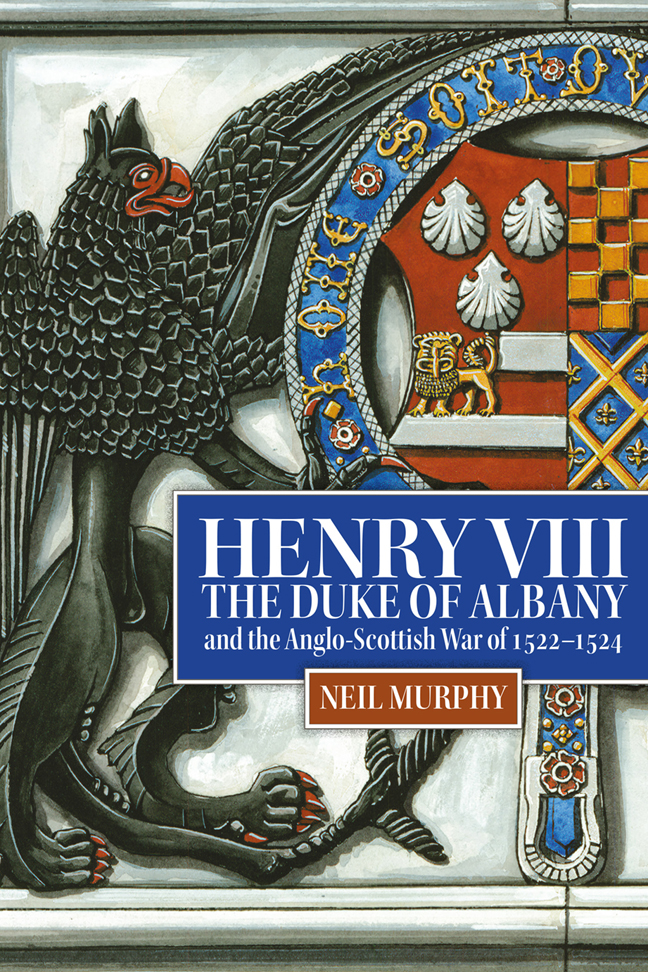Book contents
- Frontmatter
- Dedication
- Contents
- List of Maps
- Acknowledgements
- List of Abbreviations
- Glossary of Selected Scots Words and Terms
- Introduction
- 1 Albany's Return to Scotland to the Sack of Jedburgh (November 1521–September 1523)
- 2 Albany's March on Wark to the Treaty of Berwick (September 1523–January 1526)
- 3 Military Mobilisation in Scotland
- 4 The Supply of Scottish Armies
- 5 The Destruction of the Scottish Borders
- 6 The Defence of the English Frontier
- 7 Spies and Informers
- Conclusion
- Bibliography
- Index
Conclusion
Published online by Cambridge University Press: 10 January 2024
- Frontmatter
- Dedication
- Contents
- List of Maps
- Acknowledgements
- List of Abbreviations
- Glossary of Selected Scots Words and Terms
- Introduction
- 1 Albany's Return to Scotland to the Sack of Jedburgh (November 1521–September 1523)
- 2 Albany's March on Wark to the Treaty of Berwick (September 1523–January 1526)
- 3 Military Mobilisation in Scotland
- 4 The Supply of Scottish Armies
- 5 The Destruction of the Scottish Borders
- 6 The Defence of the English Frontier
- 7 Spies and Informers
- Conclusion
- Bibliography
- Index
Summary
Recent years have seen the emergence of a renewed debate around the status of the Anglo-Scottish frontier and the wider political and social conditions which predominated in the borderlands of each kingdom. In a series of influential books and articles, Steven Ellis emphasised that the specific geo-political situation of the border, and especially the need to defend the frontier against enemy attack, produced a highly militarised society. Other historians, of both England and Scotland, including Anthony Goodman, Richard Lomas, Maureen Meikle and, most recently, Jackson Armstrong, in a challenge to the views of Ellis and others, have downplayed the violence and military character of the borders and have moved away from seeing the social structures of these regions as being tethered to needs of defence.
This study of the Anglo-Scottish war of 1522–24 tends to support the view proposed by Ellis that this was a highly militarised frontier which possessed distinct socio-political systems that were tied to the needs of war. While Goodman, Lomas and Meikle and others have argued that the Anglo-Scottish wars were not especially destructive, the regions they study, particularly those in the East and Middle Marches, lay at the very centre of the conflicts of the sixteenth century, with the violence visited on Teviotdale and the Merse in 1523 ranking amongst the most brutal found anywhere in Europe during this period. Although there has been a move to present the Anglo-Scottish border as a porous frontier where the populations on either side were closely connected, these neighbourly links imploded rapidly in wartime when frontier populations were co-opted into a national struggle. Borderers were responsible for inflicting the heaviest violence on each other during the war. On the English side, for example, we saw how the population of Redesdale played a central role in a war aimed squarely at their Scottish civilian neighbours directly across the frontier.
Beyond the specific conditions of the borderlands, some historians of Scotland have downplayed the effect which war with England had on wider developments in the kingdom during this time. In her study of sixteenth-century Scotland, Jenny Wormald writes ‘among other European countries, Scotland stands as being scarcely affected by war; while other kings might face enemies on several fronts, Scotland’s only enemy was England, and even then, periods of fighting were rare’.
- Type
- Chapter
- Information
- Publisher: Boydell & BrewerPrint publication year: 2023

